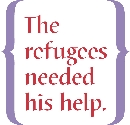times that day to ask if an answer had been received. Any time the gate opened, the crowd tried to charge inside.
Finally, the answer came from the Japanese government. It was “no.” My father could not issue that many visas to Japan. For the next two days, he thought about what to do.
Hundreds more Jewish refugees joined the crowd. My father sent a second message to his government, and again the answer was “no.” We still couldn’t go outside. My little brother Haruki cried often because we were running out of milk.
I grew tired of staying indoors. I asked my father constantly, “Why are these people here? What do they want? Why do they have to be here? Who are they?”
My father always took the time to explain everything to me. He said the refugees needed his help, that they needed permission from him to go to another part of the world where they would be safe.
“I cannot help these people yet,” he calmly told me. “But when the time comes, I will help them all that I can.”

My father cabled his superiors yet a third time, and I knew the answer by the look in his eyes. That night, he said to my mother, “I have to do something. I may have to disobey my government, but if I don’t, I will be disobeying God.”